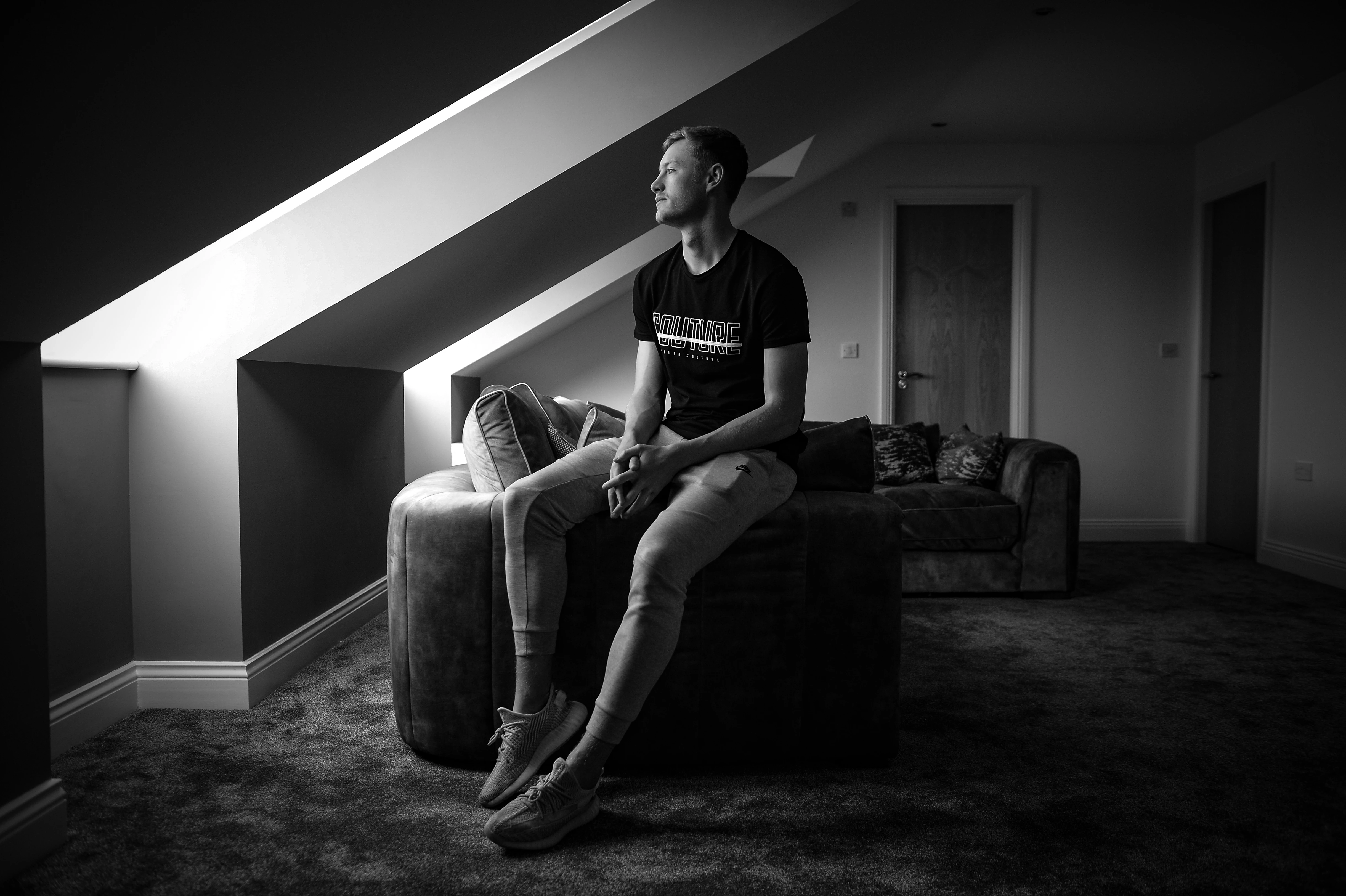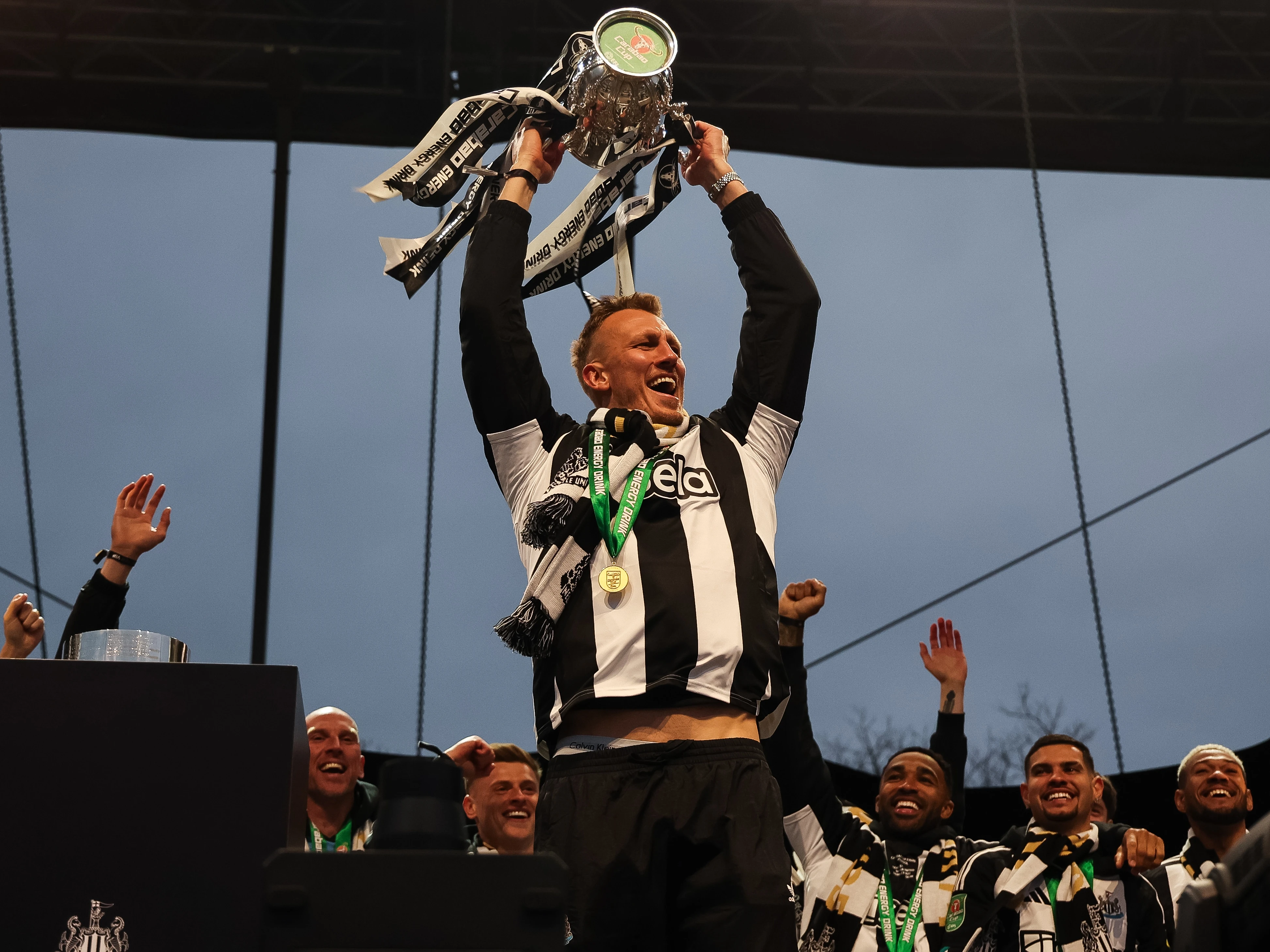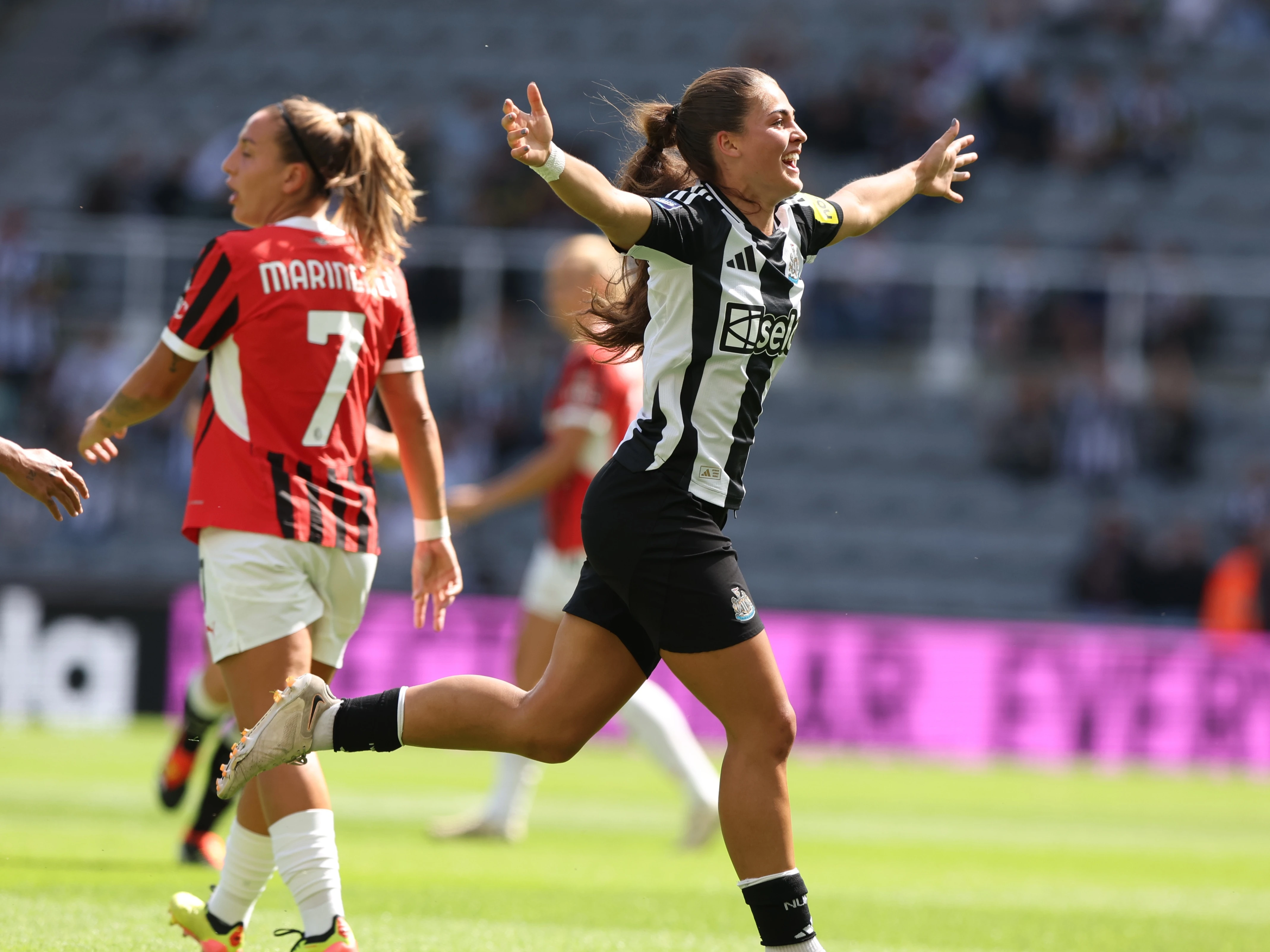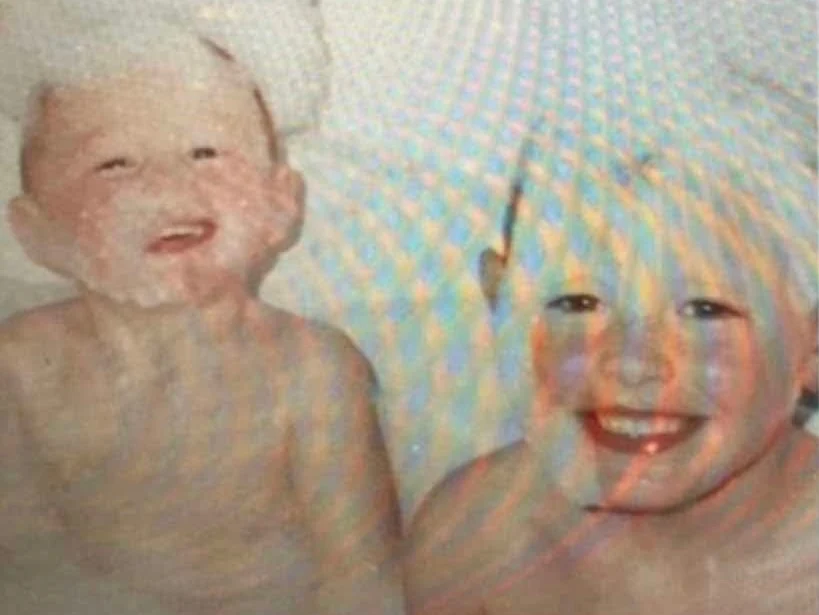“My mum, brother and sister were all sat on the settee,” he said. “I had the brace on and crutches. I sat down on the floor and they were trying to speak to me. I just said, ‘I think it’s going to be bad’. It felt like your world had just come crashing down at that point.”
Their dog, a poochon called Benji, shuffled alongside him. Few more words were spoken. His family went to bed but Longstaff stayed in the living room, wide awake, his right knee swollen and still, his mind whirring. “I just sat on the settee for hours, until the early hours of the morning, just sat there thinking about the what ifs and the whys. My little dog was downstairs with me, it was just me and him. When he got up and went upstairs to go to bed, I thought ‘it’s probably time for you to do the same’.”
A few hours earlier, on the evening of 2nd March, Longstaff had walked out onto the pitch at the London Stadium, buoyed by confidence and steadied by the poise that had marked his breakthrough season at Newcastle United. It was already a miserable afternoon by the time the youngster, desperate to do something to lift his side from their first-half slump, slid in to tackle West Ham’s Robert Snodgrass. “The ball was probably 60/40 in his favour. The Premier League’s quicker than any other level you’ll play at so before I knew it I was lunging into a tackle. It sounds so stupid, but it was whether to risk getting a red card and hurting the team, or trying to get around it and make the tackle as fairly as possible. But the way we collided, I took the worst of it. Looking back now, you’d probably do something different, but in that split second, you want to do what you think is right.
“My life had completely changed in those two months I was in the team. They were the best two months of my life so far. It happened at a time where everything was going so well.”
Longstaff, unassuming and amiable, is 21 now. He graduated from the Magpies’ academy, went on loan to Kilmarnock and Blackpool, and is now a first team player at his boyhood club. When did he begin to feel like one? “That’s a good question. I don’t know if I do now,” he said in March, his knee bound by the brace. “I’ve played games, but you see other people who have played hundreds of games in the league. That’s probably when I’d feel like, ‘yeah, I’m a proper first-teamer’. It’s a weird question. But when I played against Manchester City and scored against Burnley, I think that was probably when, I don’t know… Something changed a little bit. It gave me that sort of, ‘yeah, I should be here, and I can be here’.”
Those who know him speak of a humble young man with a boyish shyness, who admits he “goes red in probably any situation possible”, but they aren’t traits that prepare you for the kind of attention he has been the subject of in the months since his Premier League debut at Anfield on Boxing Day. “I’ll be brutally honest with you – it’s been weird,” he said. “You all know me best – I’m pretty quiet, I try and stay in the background as much as possible, and suddenly you go out for food, or anywhere, and people recognise you. It’s down to you to be the one that speaks to them, and to generate a conversation. You’ve got to give that persona. I’m getting more used to it now, I would say, and getting better at it. But especially in public, it’s half an act to be able to present yourself in that way. That other half is totally not me as a person. It’s not until after the situation when you realise, ‘I probably couldn’t have done that two months ago’.”
There has been media interest too. Longstaff, who couldn’t believe it when he was told he was required to pose for walk-on shots for Sky Sports last summer, has given countless interviews in 2019 but still can’t quite grasp why people want to know more about him. “I still see myself as the same boring person who will go to football, come home, lie on the settee and fall asleep,” he laughed. “It’s all a bit surreal but I’m getting more used to it and more comfortable in these situations. Even stuff like this, you’re letting people in a bit more. But you dream of playing and this is what comes with it. When people stop asking for stuff, that’s when you need to start worrying.”
He finds that scrutiny funny. Longstaff is usually “as nosey as possible” when it comes to learning about the lives of other sportspeople away from their craft. “I suppose it’s pretty cool that it’s come full circle, in a way.”
“That doesn’t feel right,” he winced as he sat on the turf, his face crumpled with concern. “The referee was speaking to us – I didn’t know what he was saying, all I thought was ‘my knee’s wrong’. I tried to get up straight away and went to push up on my right leg, and just collapsed on the floor.
“A million things started running through my mind. ’What is it?’ And then when you can’t get up or run, it’s ‘how bad is it?’ and, it sounds so stupid, but ‘will I be able to play for Newcastle again?’. That was honestly one of the things in my head.”
Five minutes later, he limped down the long, cavernous tunnel and into the away dressing room. Harding came over to assess him. “The faces they made when they started pulling on my knee…” he grimaced. “I was sat on the bed and no-one had said anything. The manager was speaking to us – you need to do this, you need to do that – and I just sort of blanked him out, I was thinking ‘I can’t go back on, I can’t run’.”
Longstaff remained on that bed for the second half, desperate to know what was wrong. “I still had my kit on. It was a weird time, to go from being on top of the world, cloud nine, feeling like you can do anything. Then suddenly it’s taken away and you’re at rock bottom, pretty much.”
The squad landed in Newcastle later that night and Harding drove him home from the airport. “He said, ‘I’m not going to bull**** you or give you false hope, but it is bad. You’re going to be done for the rest of the season’. At that point, it kills you.”
There is a rich and well-documented sporting heritage in the Longstaff family. Sean’s father, David, was the first man to earn 100 caps for Great Britain in ice hockey. His younger brother, Matty, is currently part of United’s under-23 side. As the brothers grew up, they would watch their father play at Whitley Bay Ice Rink and even take to the rink themselves, familiarised with the graceful but often brutal nature of the game.
“I always speak to my dad, and he says sport’s got a funny way of dragging you right back down to earth,” said Sean, recalling the knee injury David suffered in his youth and the fights, sliced fingers, limbs and other wounds they’d witness on the ice. “You’d just see them get on with it. I think that’s why we are the way we are. If we get a knock, it’s, ‘are you injured, or are you hurt?’ You can probably play when you’re hurt. That’s why I tried to carry on at the time.” His uncle, the former Newcastle, Celtic and England winger Alan Thompson, broke his neck in a car crash in 1990. “If you can come back from that, what’s a knee injury in the grand scheme of things?”
Beyond that bullishness lay worry. It was still March when his private hopes – “is it as bad as you think? Maybe it’s healed OK?” – were dampened by a specialist in London who confirmed a full rupture of his posterior cruciate ligament, an injury not uncommon in car crashes. He was instructed to wear the brace for eight weeks. There would be no surgery but he could no longer drive; he became reliant on friends and family just to get around, to the shops and to the training ground gym where he would spend most of his summer. As the diagnosis was delivered, he zoned out, just as he had done in the away dressing room at West Ham. “Any bit of hope that was left, that sucked it out of me.”
Living with his parents and siblings helped as he came to terms with it. “I still have my mam to cook and clean and do everything for me, so it’s still pretty easy at the minute,” he laughed in April. “Even to just have a cup of tea with my mam and speak to my sister, annoy her for a bit – you have to just try and keep your mind occupied and focus on something that’s not the injury and not football.” By his own admission, he is “partial to a sweet or two” – Matt Ritchie would nag him, extolling the virtues of eating well – but he had to be careful, with his leg muscle wasting and his movement limited by the unwieldy metal structure that wrapped his knee.
The season was over by the time he returned to the gym in mid-May, free of the brace. Miguel Almirón, himself recovering from a hamstring injury, had been in, but had then left to join up with the Paraguay squad. It was just Longstaff and rehabilitation coach Cristian Fernández in the bright, airy, empty gym at United’s Benton base. With 60 kilograms loaded onto the bar on his back and his feet parallel, he squatted, again and again, up and down. After, he shrugged at the isolation of it all. “I’m in by myself. This is probably the toughest bit. In the season, even if you’re injured, the lads are still in – you can speak to them and have a craic. Now everyone’s away, you’re on your own. But you’ve got to do it.”
There were times that month when he would be in the living room at home, with Sky Sports News on the television. He would hear his name and look up from his phone. “You’re sat there on the settee, and then suddenly there’s news comes up, and it’s your name on the thing. It’s crazy. You grow up seeing other players’ names on there and you never once think, ‘I’m going to be on there one day’,” he said. “The last 12 months has been crazy, it’s been one thing after another. Every time I see myself on the telly, I still think it’s really weird. I’m still getting used to it.”
Almost three months had passed since that collision with Snodgrass, a tackle he had replayed only once since it happened – by accident, when its inclusion in an NUFC TV interview with Jonjo Shelvey caught him by surprise. Longstaff had just returned from Orlando, Florida, where he spent the last week of June with his parents, grandparents, siblings, auntie, uncle and cousins. He also visited Las Vegas – where he met up with Paul Dummett and the former Blackpool defender Tom Aldred – before taking a day trip to Miami, and spent some time in the gym with Matty. It helped to have someone there with him, that company and camaraderie he’d missed, but he couldn’t fully switch off.
It was the second time Longstaff had been away during his rehabilitation. He flew to Toronto with his dad and agent at the end of April, ticking one thing off his bucket list by taking in the Maple Leafs’ play-off game against Boston Bruins and meeting some of the players. As a child, he used to stay up late to watch basketball too, admiring LeBron James’ durability and manner on and off court during his Cleveland and Miami days – “something I gravitated towards”, he said. He still records the finals and avoids his phone before watching it the next morning, so when the chance to watch an NBA play-off game in Canada arose he took it, marvelling at the way the Toronto Raptors and Orlando Magic players moved and jumped. Mainly, though, he wondered what it must have taken for Kawhi Leonard to return to that level from a gruesome knee injury of his own.
The trips took his mind off things in bouts but he knew what awaited when he came home; the monotonous strength work, the empty gym. “I always thought to myself, ‘it will be alright when they (his teammates) are away’, but actually, it wasn’t really,” he admitted. “I probably have struggled a bit to get used to it. You’re forcing yourself to do stuff you don’t normally need to force yourself to do.” His eyes would glaze over again, and his parents would feel the need to check if he was OK. “Having it all ripped away, and suddenly you’re searching for something, and looking for something to do with your time. I think you’re looking for something that’s missing, in a way.”
It is curious that Longstaff has not represented his country at any level. As a teenager he would see his peers, like Freddie Woodman and Adam Armstrong, join up with England and wonder when, or if, the call would come. He sees similarities between his international status during his teenage years and his first steps into Newcastle’s under-23s; there always seemed to be others who were ahead of him, who were primed for more.
Still eligible for England Under-21s, he is thought to have been in line to make his bow at June’s European Championships in Italy and San Marino. He would have loved to have been there and, lifted by the belief that has swept over his easy-going nature in 2019, he felt he would have merited a place. Now, he has to do things his way. “One day when I get in that position, I want to be the one who does it differently, and shows people you don’t have to be the top player at 14, 15 or 16 – it’s more what happens when you get into senior teams. If I can ever get into an England squad, that’s how I want to do it – show people that you don’t have to do it the way that everyone thinks you do,” he said. “If someone said to me, ‘you can either play for England at under-16, 17 or 18 level or play for Newcastle United in the Premier League’, you know what the answer would be.”
It is a mark of how far Longstaff has come that such a conversation about England is justifiably on the agenda, a year after he was playing in League One for Blackpool. He knows, even if it is tough to elicit as much from him, that exciting times lie ahead for him and, in mid-June, he began to run again. “At the start there’s always something in the back of your mind. ‘Is it right? Is it going to support us? Am I ready to do it?’” he said with caution, having completed a pain-free session on an anti-gravity treadmill. “It felt pretty good today. You don’t want to get too far ahead of yourself and then see it come back to bite you. But today, it felt good.”
He took heart from the many messages he has received from supporters on social media, wishing him well as he neared a return. It is a medium he is, perhaps wisely, wary of; his dad used to warn him that you only get one chance to make a first impression and, not wanting to put himself ‘out there’, he uses it sparingly; his Twitter header remains a grainy phone-taken picture of him scoring for the under-18s at Manchester City in 2014, and he has posted just 22 images in five years on Instagram.
It seems in keeping with the private young man he has remained since his emergence, but he remembers having his eyes opened to a new level of online exposure when he picked up his phone after his senior United bow, at Nottingham Forest last August. Notifications and messages, once only sporadic on his social accounts, flooded his iPhone. He has seen criticism, memes, fake accounts, those hyperactive, anonymous profiles that seem to have a response to everything and anything, but some humour, too. “There was one message I got,” he laughed as he flicked through some old tweets, “saying happy Mother’s Day to my mum, for making me.”
In December 2018, Longstaff knocked on Rafa Benítez’s door and asked if he could go out on loan. “It was funny. He just sort of looked at us. He said, ‘you can’t go yet’.” A month later, after a cameo at Anfield and a goalscoring full introduction at Blackburn in the FA Cup, he was back at the manager’s desk, being shown clips of Chelsea’s midfield ahead of a first Premier League start at Stamford Bridge. “I remember thinking, ‘you’ve asked for this. It’s up to you now’.”
He was having lunch in the Naked Deli with Dummett when news of Benítez’s departure broke in June. Later that week, Longstaff walked to the shops in North Shields – cap on, head bowed – to buy some milk. Even there at the counter he was willed to stay, just as the children at his old school, John Spence Community High School, had when he turned up to hand over awards at their presentation night. He thought back to that meeting in December, and how not long ago he thought his year would be spent in League One again. Everything had moved so fast. It felt strange. His life had changed.
By the start of July, with the squad having returned for pre-season and the once empty, lonely gym now humming with activity, he was sprinting without fear. He had spent much of the previous month working at three-quarter pace, building muscle and stability with the repetitive yet challenging gym work that tests both will and patience, but he knew he was ready for full training. Fernández threw him the ball, and he prodded it back on the volley, left foot then right, before spraying some passes across the artificial indoor pitch at Darsley Park. Those 20-yarders were among the most rewarding of his life. “You put the boots back on, and you start to feel like a footballer again. It sounds so stupid, but when you’re just passing it properly, as you would do in a game – passing it hard – and when there’s no pain and it’s a good pass, you think, ‘that was good, that’. You’ve never thought like that before.” He grinned. He was getting closer.
In the Pudong Shangri-La hotel Longstaff woke up late, as he always did on a matchday. He had spent the last week in China for the Premier League Asia Trophy, training alongside teammates – including his brother Matty – in the dizzying heat of Nanjing and Shanghai. “There’s been a few little tackles where I’ve thought, ‘it’s happening’ and then I’ve thought, ‘is it OK?’, but it’s been fine,” he said. “I’m just waiting for one big one now, and then I think I’ll be fine.”
It is tempting to look for signs that the past seven months and the injury has remoulded him somehow, or provided him with some kind of broader perspective on the sport’s harsh realities, but if there are any they aren’t readily apparent. He seems just the same as he always has been, grounded and affable, if a little more self-assured than he was as a teenager. His surroundings have changed; there is a new manager to impress now and in a year of firsts, this is another. Steve Bruce is a man who had the same dreams Longstaff had as a boy. “It’s just about being yourself,” he said of the need to impress. “Ultimately, if you’re doing stuff you wouldn’t always do, you’ll get found out.”
So Longstaff did what he always does. He sat down in the dressing room at the Hongkou Football Stadium, on the bench below the shirt bearing his name. He had kept his head down when he walked into the tired old dressing room at St. Patrick’s Athletic a year ago, wary that he was the new face in such a daunting environment, but now he belonged. He pulled on his socks – two pairs on each foot and some cut offs, left then right – and hoisted them up above his knees before pulling the shirt, which meant the most to him, over his head. At the end of his warm-up on a humid Shanghai afternoon, he struck the net from 20 yards, trying to manipulate the ball’s movement through the air. It is just habit now.
There was 25 minutes of the game remaining. Eyes in the stands trained on him as he took off his yellow bib and walked up to the touchline. He wasn’t thinking about West Ham, his opponents once again after 20 weeks of frustration, or his knee, the draining hours in the gym, or even the possibility that Matty might get on later too. He focused on the grass in front of him. Everything felt normal again. “You’ve asked for this. It’s up to you now.”
It is 2019 but Longstaff is growing up in black and white, and that’s just the way he always hoped he would. The number 36 flashed in green on the electronic board above his head, the searing air filled his lungs, and he ran back out onto the pitch.




